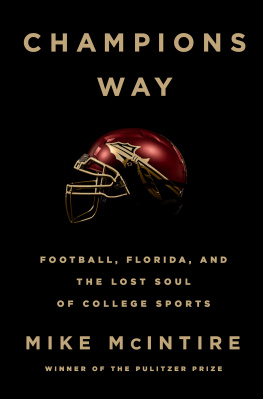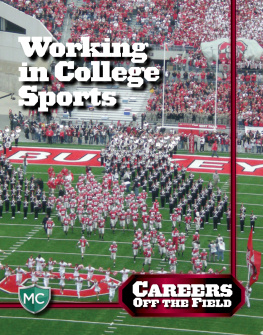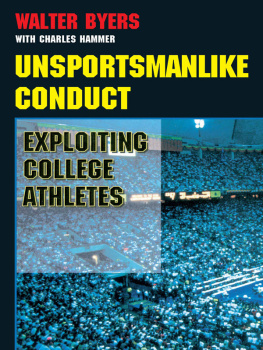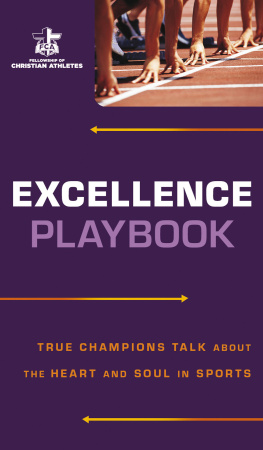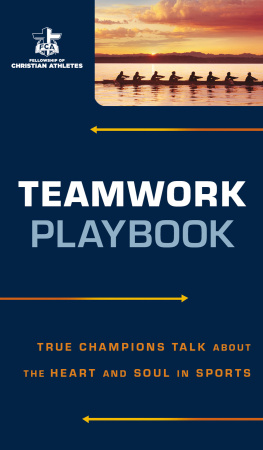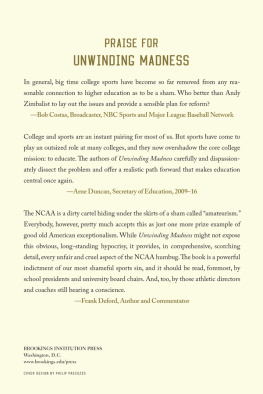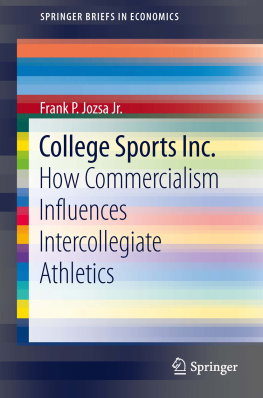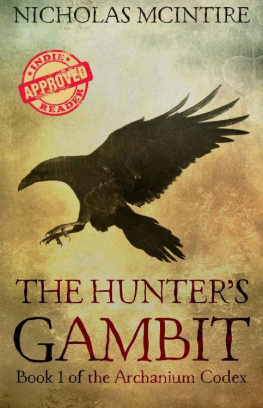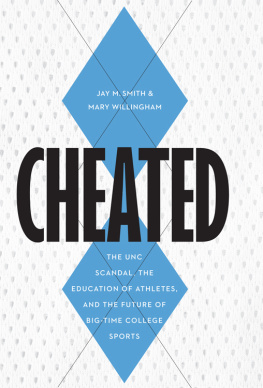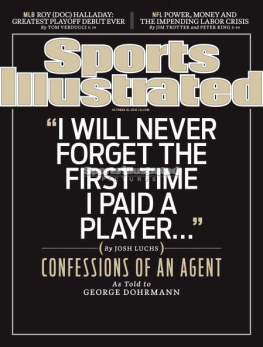
CHAMPIONS WAY
Football, Florida, and
the Lost Soul
of College Sports
MIKE McINTIRE

W. W. NORTON & COMPANY
Independent Publishers Since 1923
New York | London
Copyright 2017 by Mike McIntire
All rights reserved
First Edition
For information about permission to reproduce selections from this book, write to
Permissions, W. W. Norton & Company, Inc., 500 Fifth Avenue, New York, NY 10110
For information about special discounts for bulk purchases, please contact
W. W. Norton Special Sales at specialsales@wwnorton.com or 800-233-4830
Book design by Chris Welch
Production manager: Anna Oler
JACKET DESIGN BY PETE GARCEAU
JACKET PHOTOGRAPH BY FREDRIK BRODEN
ISBN 978-0-393-29261-9
ISBN 978-0-393-29262-6 (e-book)
W. W. Norton & Company, Inc.
500 Fifth Avenue, New York, N.Y. 10110
www.wwnorton.com
W. W. Norton & Company Ltd.
15 Carlisle Street, London W1D 3BS
To Maggie, without whose love and support this would not have been possible.
And to Walt, the best journalism partner and mentor one could hope for.
T he gambler on the phone was threatening to kill me. And break my legs, though not necessarily in that order.
This was the late 1990s, and I had little experience writing about sports. I did know about corruption, however, which was why I had been asked to do a story about a wannabe sports agent accused of showering cash and gifts on promising basketball players at public universities in Connecticut and Massachusetts, including future NBA stars Marcus Camby and Ray Allen. My talent, if you could call it that, was ferreting out white-collar crime. Sweetheart real estate deals for state lawmakers, a briefcase of cash for the mayor, campaign checks from phony donorsthat sort of thing. I did enjoy following pro football and baseball, but a college game was mainly for passing the time in front of the television on a rainy Saturday.
So, with no connections in the world of college athletics, I fell back on what I normally did. I searched public records, and eventually wound up in the clerks office at federal court in Connecticut, examining a petition for Chapter 7 bankruptcy filed by the sports agent. Seems he had borrowed a lot of money to finance his efforts to ingratiate himself with players. Among the $100,000 in debts he listed were loans from a couple of guys who liked to place bets on college gamesraising the possibility that gambling money had made its way into the pockets of student-athletes, a mortal sin under the rules of intercollegiate play.
Now, one of those sports bettors was on the line, insisting that if I put his name in the paper he would drive to the newsroom and shoot me in the head.
I swear to fucking God, he shouted, I will blow your fucking brains out!
What to do?
I decided that transparency was the best defense. When the story was published, I included his threats, figuring that if I later turned up dead, I would have at least been able to leave a big fat trail marker pointing to my likely killer. As it happened, I neednt have worriedI never heard from that guy again. My real enemy was one I hadnt even seen coming: the legion of rabid fans of University of Connecticut basketball who called to curse me out, make crude threats, and hurl insults. They werent concerned that young athletes had taken money, jewelry, and plane tickets from an unscrupulous hustler with connections to gamblers. Rather, they were upset that I had drawn attention to it and besmirched the reputation of their beloved team. They took it personally.
I didnt know it at the time, but I had just lost my virginity as a sports journalist. I quickly determined that it wasnt something I wanted to repeat any time soon, so for years afterward I stuck to the relative safety of outing crooked politicians, most of whom did not enjoy a fan base sufficiently motivated to harass reporters. Still, the experience had left an impressionand it was not a good one.
Professional sports, to me, had always seemed like the place to expect occasional unsavory headlines. The NFL or NBA player caught with a gun or punching his girlfriend or doing drugs in his Bentley. It was just a given that in a gold-plated fantasyland of bling, balling, and billion-dollar teams, adults would do stupid things once in a while. But college is supposed to be different.
College is where students who are good at a sport, or at least enjoy it, can play in their spare time to round out their education. Sure, the really good athletes can also use it as a springboard to the pros. But at its core, intercollegiate athletics is intended as a healthy adjunct to the pursuit of an academic degree. Where did I get this crazy idea? From the National Collegiate Athletic Association, the governing body of college sports, which for a century has been saying that graduating from college is as important an achievement as winning on the field.
But that clearly isnt true. And it never has been.
When fans sit down in front of their sixty-inch high-definition Samsungs for a college game on ESPN or one of the proliferating number of cable networks run by the colleges themselves, theyre not hoping to find out how the players are doing in their math classes. They want to be entertained. AT&T, Capital One, and Coca-Colaall NCAA corporate championspony up millions to associate their brands with that entertainment, and it isnt the graduation rates of the athletes that interests their marketing departments. Nor is that what university presidents and athletic directors dwell on when reclining in the skyboxes of their new luxury stadiums, hobnobbing with well-heeled boosters who help pay their salaries.
In fact, the modern college athletic department is attached to the school in name only. It functions essentially as a subsidiary of corporate funders, unaccountable private booster groups, and professional marketing giants like IMG and Learfield, which are so embedded at some universities that they use campus offices and control everything from stadium advertising to the coachs radio show. The money to be made is so alluring that Wall Street has jumped in, with private equity firms bankrolling companies that cater to college sports. Along the way, this corporate-athletics complex and its supporters in Congress have bullied the Internal Revenue Service and rewritten the tax code to preserve the fiction that it is all a tax-exempt educational pursuit, instead of a nakedly commercial enterprise.
The mind-boggling financial stakesthe NCAAs Division I alone had revenue of $8 billion in 2013naturally leads to ethical compromises and the cutting of corners. Much of it occurs outside of public view, in the incremental decisions of administrators to trim academic budgets while borrowing millions for new stadiums, raise athletic fees for all students, and shift or cancel classes to accommodate games. At its worst, the negative effects are manifest in academic cheating scandals, lowered admissions standards for star recruits, and the arrests of players for everything from rape to attempted murderall poison to the carefully tended reputation of a school.
How did we get to this place at our institutions of higher learning, where education, the law, and even basic morality take a back seat to the rapacious, smashmouth needs of the multibillion-dollar business empire known, quaintly, as intercollegiate athletics?
It only makes sense if you accept that big-time college sports exists as an end unto itself. Certainly it has its benefits. It gives local fans something to cheer, students and alumni feel good about their teams, and for a select few schools there are monetary and institutional rewards. But for the most part, it is simply an entertainment platform, broadcast to millions of viewers who have no attachment to the schools involved and directed by well-paid professionals whose primary mission is to grind out wins.
Next page
